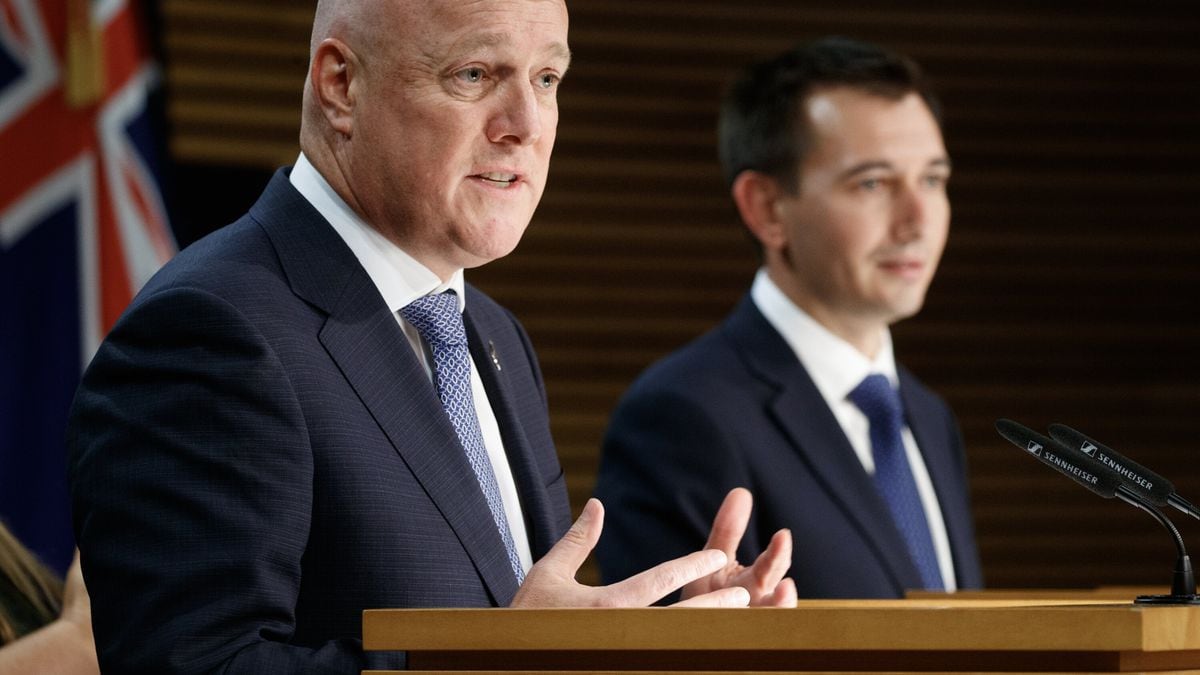Transport Minister Simeon Brown has kept National’s promise not to hike fuel taxes this term – just.
He will scrap Labour’s proposed gradual hike of 12 cents a litre increase to fuel taxes over the current term and delay that until the first year of the next term of Parliament, when fuel taxes will rise by 12 cents in one go.
The hikes don’t stop there, after the hike in January 2027, fuel taxes will increase by 6 cents a litre in 2028 and four cents a litre each year after that, meaning by the end of the next term, the Government will have raised fuel taxes by 22 cents a litre.
These increases will be accompanied by an equivalent hike in road user charges.
Brown announced the increases as he released a draft version Government Policy Statement on Land Transport, which is essentially a transport budget, setting out how much the Government wants to raise from road users in fuel taxes and road user charges, and where it would like that money to be spent.
The draft will go out for consultation before taking effect on July 1 and take effect for the next six years, or until it is renewed, which will probably happen in three years time.
The two centrepieces of the plan are a greater focus on road maintenance with a pothole repair fund and restarting the last National Government’s Roads of National Significance (RoNS) programme, with 15 new roads set to be delivered under the programme.
Brown said the RoNs were “some of New Zealand’s most successful state highway corridors, reducing congestion and improving safety”.
The draft GPS did not put a dollar figure on the new roads. NZTA costings obtained by the Herald showed the roads could cost twice as much as National had budgeted them during the election, leaving the party $24 billion short.
The GPS tells NZTA how much money should be spent in different areas of the transport system, called “activity classes”.
Brown has created two new activity classes for pothole prevention. One class will spend up to $2.3b of pothole maintenance for Government-owned state highways, the other class will spend up to $2.5b on fixing potholes on council-owned local roads.
Brown said he wanted the funding to lead to “2 per cent of the state highway network renewed each year”.
The plan has seen some big cuts from when Labour was in charge. Labour also published a draft GPS for the same period. National has killed funding for inter-regional rail, which could mean an end to the Te Huia train line.
It has also axed funding for coastal shipping, which had been given up to $20 million a year. This funding was to encourage people to ship freight by water, rather than putting it on trucks. Labour reasoned that this would take pressure off the roading network by having fewer trucks.
Funding for public transport has been cut dramatically. Labour planned to spend up to $3.2b on public transport infrastructure over the next three years. This has been slashed by nearly $1b.
The funding pot for council subsidies to public transport services has also been cut, which could mean councils being forced to hike fares. Labour had promised up to $2.8b in subsidies over the next three years. The new Government has cut this to $2.3b.
Brown said the last Government increased public transport funding by 71 per cent in five years, despite patronage declining by 23 per cent – although he conceded some of this was due to the pandemic.
He said the “private share” of funding for public transport had fallen from 32 percent to 11 per cent in the same time.
Funding for walking and cycling improvements has nearly been halved from $1b under Labour to $510m under this plan.
Brown indicated further work will be done to fix the broken transport revenue system which has seen revenue raised from fuel taxes dwindle.
This work was begun under the last National Government and was significantly accelerated under the last Labour Government. The changes will probably mean an end to fuel taxes which would be replaced by a universal road user charge.
Prime Minister Christopher Luxon said the draft Government Policy Statement on land transport invested more than $20 billion over three years. The key part of the GPS was the 15 Roads of National Significance programme, as well billions committed to addressing potholes.
Luxon said increasing road maintenance was crucial for his Government, saying many Kiwis had experienced the poor quality of some roads.
On safety, Luxon talked about the low number of people who thought they would get caught drink-driving. He said that attitude was “frankly unacceptable” and needed to change. Investments would be made in enhancing breath-testing stops.
Brown said it was not only national roads but some local routes which would receive upgrades through the Government’s focus on roads.
/cloudfront-ap-southeast-2.images.arcpublishing.com/nzme/WYJB5HJIUFGOXDPULK37WM5L5E.jpg)
Luxon fronted media at his post-Cabinet press conference this afternoon.
Luxon is likely to face questions about Broadcasting Minister Melissa Lee’s briefing to Cabinet on the state of the media industry following last week’s shock announcement Newshub would close.
It’s possible he’ll also respond to queries concerning the free school lunches programme after a coalition of health charities criticised the decision to give ministerial responsibility for free school lunches to David Seymour after the Act leader campaigned for the programme to be abolished.
The Herald is broadcasting the press conference live and carrying live written updates in this story.
The Government’s 100-day plan, which is fast approaching its March 8 deadline, said it would begin work on its transport budget, known as a Government Policy Statement on Land Transport, or GPS.
The GPS is a document that sets out how NZTA spends money it receives from fuel taxes and road user charges, roughly $4b a year. That money gets funnelled into new transport projects, including the Government’s plans to restart the Roads of National Significance Programme.
Data obtained by the Herald showed the roads National had promised to build at the election had come in well above what had been costed at the election.
Last week, Luxon confirmed Lee would be briefing Cabinet on the state of the news media industry after Warner Bros Discovery announced its intentions to close Newshub’s news operations in June.
Lee has come under fire from Labour’s Willie Jackson, who said her response to the news last week lacked empathy and was “total waffle”. She denied she downplayed the closure of Newshub in her initial response on Wednesday, but admitted she might not have articulated it well.
Lee had said on Wednesday there was nothing the Government could have done to stop the closure, and had downplayed the impact of losing one of the two main news channels in the television sector, saying plurality was not an issue because it was now a multi-media world, and radio and newspaper sites were also creating video.
Adam Pearse is a political reporter in the NZ Herald Press Gallery team, based at Parliament. He has worked for NZME since 2018, covering sport and health for the Northern Advocate in Whangārei before moving to the NZ Herald in Auckland, covering Covid-19 and crime.




 New fishing rules for kina infestation in Northland criticised by scientists
New fishing rules for kina infestation in Northland criticised by scientists